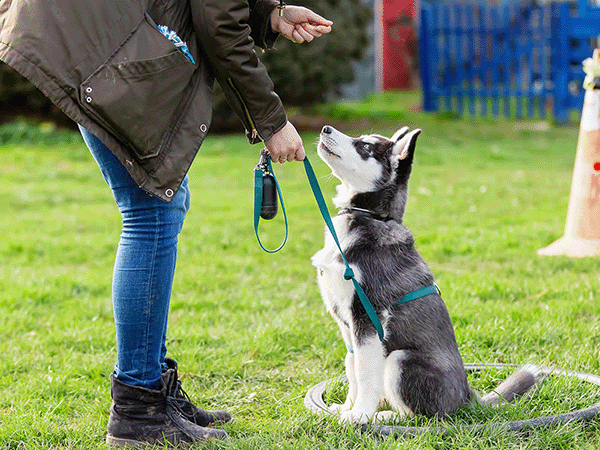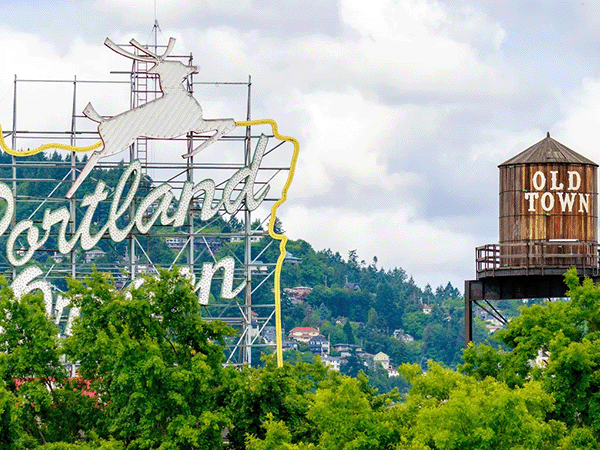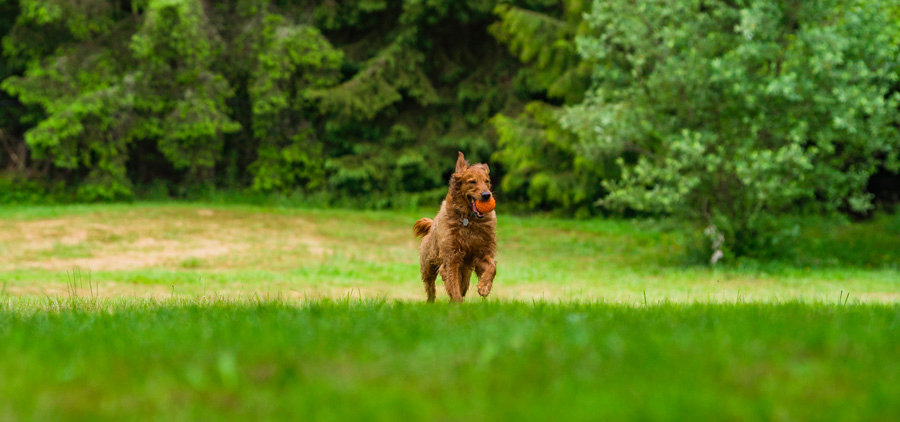Doberman Pinscher: Breed Facts, Experience and Tips from 9,000+ Owners

Discover the Doberman Pinscher, a breed celebrated for its alert, loyal, and trainable nature. Considered a large dog, Doberman Pinschers were originally bred in Germany for guarding, protection, and police work beginning in the 1890s.
In this post, we share insights from almost 10,000 Sniffspot users, offering practical advice for new and prospective Doberman Pinscher owners. Whether you’re considering owning or rescuing a Doberman Pinscher yourself or already have one, you’ll find valuable tips on how to care for and enjoy life with an alert Doberman Pinscher.
“They are velcro dogs, highly trainable, adorable and goofy creatures,” says Sniffspot user V. Thinking a Doberman might be the breed for you? From their striking looks to their loyal nature, Dobermans possess a unique blend of power and affection. But before you welcome one into your home, it's crucial to understand their needs, especially Doberman energy level. This guide covers everything from temperament and training to health and finding reputable breeders. So, whether you're a seasoned dog owner or a first-timer considering if Dobermans are good for first time owners, we'll help you decide if this intelligent breed is the right fit for your lifestyle.
Source: Sniffspot Community Breed Survey 2024
Doberman Pinscher At a Glance
- Breed Type: Working (Guard)
- Size: Large
- Life Expectancy: 10 to 12 years
- Healthy Weight Range: 60 to 100 lbs
- Height Range: 24 to 28 in
- Temperament: Alert, Loyal, Trainable
- Coat Type: Short, smooth coat
- Color: Black, blue, red, and fawn (sometimes with rust markings)
Getting to Know the Doberman Pinscher
According to almost 10,000 Sniffspot community users who shared real-world data about their Doberman Pinscher, we learned these dogs are alert and loyal. The Doberman Pinscher is very friendly and social with children and very friendly with other pets.
When living with a Dobie, 86% of our owners said a large house with a fenced yard is ideal. Additionally, 39% of owners said a rural or suburban area with open spaces is also acceptable. This dog is highly trainable by all types of dog owners and owners say the Doberman Pinscher learns best with positive reinforcement, training aids, and consistent routines.
When it comes to exercise, 51% of Sniffspot owners say their Doberman Pinscher benefits from moderate exercise every day, including between 1-2 hours of activity each day, including walks and active play sessions. The Sniffspot Dobie community would not recommend this dog for first-time owners.
Key Takeaways
- Doberman Pinschers thrive on activity and training: These intelligent and loyal dogs need consistent mental and physical exercise (1-2 hours daily) to be their best selves. Evaluate your lifestyle to ensure you can meet their needs.
- Early socialization is key for a well-adjusted Doberman: Start socializing your Dobie early to help prevent reactivity and build confidence. Positive reinforcement training methods are most effective for this breed.
- Responsible breeding matters: Seek out a reputable breeder who prioritizes health testing and early socialization to minimize potential health and behavioral issues. Thorough research is essential.
Origins of the Doberman Pinscher
In the late 19th century, a tax collector named Karl Friedrich Louis Dobermann from Apolda, Germany, created the Doberman Pinscher by selectively breeding dogs to assist him in his tax-collecting and night watchman roles. The exact breeds used are unknown, but German Shepherds, Rottweilers, and other working dogs likely contributed to the Doberman’s traits.
The breed first appeared at a dog market in 1863 and made its show ring debut in 1897. Enhancements from English breeds like the Manchester Terrier and Greyhound refined its appearance. Otto Göller played a significant role in promoting the breed and establishing its standards.
Today, the Doberman Pinscher is known for its sleek look and loyalty. The breed’s service as war dogs during World War II highlighted its bravery, and despite changes in its name and appearance, it remains a symbol of steadfast protection and intelligence.
Doberman Pinscher Temperament & Traits
- Temperament: Alert, Loyal, Trainable
- Energy Level: Moderate
- Trainability: Highly trainable – Learns commands quickly and responds well to training.
- Grooming needs: Low maintenance – Requires minimal grooming to maintain smooth coat, such as occasional brushing and baths.
- Good with Kids: Very friendly and social with children
- Good with Other Pets: Very friendly with other pets
Doberman Pinscher Ownership: What to Expect
As a Doberman Pinscher owner, it’s important to know the best dog breed tips as well as expectations from current Doberman Pinscher owners to maintain a healthy breed.

Source: Sniffspot Community Breed Research 2024
Doberman Grooming Needs
Doberman Pinscher dogs require low-maintenance grooming. This means Doberman Pinscher owners should expect minimal grooming, like occasional brushing and baths. Doberman Pinscher dogs have a short coat, ideal for protection and appearance. Their short coat is considered moderate shed, unlike double coat breeds.
To keep your Doberman Pinscher’s coat healthy and up to breed standards brush weekly to remove loose hairs and keep the coat healthy. Of the coat types for common breeds in the working dog group, the coat grooming needs for Doberman Pinscher are low maintenance.
Doberman Exercise Needs & Energy Levels
Doberman Pinschers require moderate activity each day, and they need plenty of exercise to stay healthy and happy. Though one of the most popular dog breeds, Dobies are considered a very athletic, high-energy breed. Dobies make great pets, and they thrive with between 1-2 hours of physical exercise and activity each day, including walks and active play sessions. Owners of Dobies report their dogs especially love chasing/playing with a ball or frisbee, tug-of-war, and playing with squeaky toys. In other words, they love mental challenges!
When large breeds like Dobies don’t get sufficient physical exercise, they’re more likely to act out on undesirable behaviors like developing reactivity or separation anxiety. They need consistent training, mental challenges, and regular moderate exercise to avoid excess energy.
Understanding Your Doberman's Exercise Needs
Variability in Energy Levels
Doberman Pinschers are energetic dogs. They need plenty of exercise and playtime to burn off energy. Most Dobies require at least 1.5 to 2 hours of exercise daily. This can include brisk walks, jogging, running in a securely fenced area (like a Sniffspot), or interactive play sessions. Keep in mind that each dog is an individual. While these guidelines offer a solid starting point, you’ll learn your own dog’s specific needs over time. Some Dobies might need a bit more activity, while others might do fine with a little less. For example, sources like PetMD emphasize the breed's high energy.
The Importance of Mental Stimulation
Dobermans are intelligent dogs and thrive on mental stimulation. Just like physical exercise tires them out, mental exercises can do the same. In fact, mental stimulation is just as important as physical exercise for a well-balanced Doberman. This can include training sessions, puzzle toys, or even learning new tricks. The American Kennel Club also highlights the importance of mental engagement for this breed. Check out our resources on dog training for some great ideas.
Age and Energy Levels
A Doberman’s energy levels can change with age. Puppies, as you might expect, are often bundles of energy, while adult dogs may have more moderate needs. Some owners have even reported that their Dobermans become calmer around 4 years of age. Online discussions among Doberman owners often mention this shift in energy as the dogs mature. It’s important to adjust your exercise routine as your Doberman grows and ages to meet their evolving needs.
Meeting Your Doberman's Exercise Requirements
Types of Exercise
Dobies benefit from a variety of exercises. Our Sniffspot community has found that Dobies especially love chasing balls or frisbees, playing tug-of-war, and playing with squeaky toys. These activities provide both physical and mental stimulation, keeping your Doberman engaged and happy. You can also find dog-friendly water parks on Sniffspot if your Dobie loves to swim.
Frequency and Duration
According to our Sniffspot community, 51% of Doberman owners aim for moderate exercise every day. This typically involves 1-2 hours of activity, including walks and active play sessions. Consistency is key. Regular exercise helps prevent boredom and destructive behaviors. It also strengthens your bond with your dog.
Tools and Resources for Exercise
For some Dobermans, simple walks aren’t enough. You might need to consider longer runs, bike rides (with appropriate safety gear for your dog), or even doggy daycare. Some owners find that more intensive activities are necessary to meet their Doberman's exercise needs. If you’re looking for a safe and enriching environment for your Doberman to play and socialize, Sniffspot offers a variety of dog parks and spaces where your dog can run and play freely. You can also find top dog trainers near you through our website.
Feeding Your Doberman
What should you feed your Doberman Pinscher to keep him healthy? As a moderate energy breed, what you feed them is important. A reported 61% of our community feed their Dobie commercial dry kibble.
As an active breed, Dobies should eat 3 to 4 cups of vet-recommended food to maintain a healthy weight around 60 to 100 lbs. However, your Doberman Pinscher’s ideal weight and food depend on your pet’s sex, activity level, and age.
Doberman Health Concerns
The Doberman Pinscher breed is most prone to digestive issues (e.g., bloating, sensitive stomach) and skin conditions (e.g., allergies, dermatitis). A reported 47% of our Doberman Pinscher owners reported digestive issues like constipation, diarrhea, vomiting, lack of appetite, and a condition known as Gastric Dilatation-Volvulus (bloat). Dobie’s risk for these challenges increases as they age.
Similarly, 46% reported skin conditions like allergies, yeast infections, impetigo, ringworm, alopecia, and folliculitis. Lastly, 45% of Doberman Pinscher owners claim their dog struggles with heart conditions like heart valve disease, congenital heart disease, heartworm disease, murmurs, and so on — a common Dobie health concern. If you’re worried about any of these health issues above, talk to your Dobie’s vet.
Common Health Issues in Dobermans
Doberman Pinschers are generally healthy, but like all breeds, they're prone to certain health conditions. Being aware of these potential issues can help you provide the best possible care for your Dobie. It’s always a good idea to discuss any concerns with your veterinarian.
Dilated Cardiomyopathy (DCM)
Dilated Cardiomyopathy (DCM) is a serious heart condition that weakens the heart muscle, reducing its ability to pump blood efficiently. This can lead to symptoms like exercise intolerance, weakness, coughing, and rapid breathing. DCM is particularly prevalent in Dobermans, making regular veterinary check-ups with a focus on heart health essential. Early detection and management are key to providing your dog with the best quality of life.
Gastric Dilatation-Volvulus (GDV or Bloat)
Gastric Dilatation-Volvulus (GDV), commonly known as bloat, is a life-threatening condition that affects many deep-chested breeds, including Dobermans. Bloat occurs when the stomach fills with gas and twists, cutting off blood supply. Symptoms include a distended abdomen, retching, excessive drooling, and restlessness. If you suspect your Doberman is experiencing bloat, seek immediate veterinary care as it’s a true emergency.
von Willebrand's Disease (vWD)
Von Willebrand's Disease (vWD) is an inherited bleeding disorder that affects blood clotting. Dobermans are among the breeds at risk for vWD. While not all dogs with vWD show symptoms, it can lead to excessive bleeding during injuries or surgical procedures. Genetic testing can determine if your dog carries the gene for vWD, which is valuable information to have, especially before any planned surgeries.
Hip Dysplasia
Hip dysplasia is a genetic condition where the hip joint doesn't develop correctly, eventually leading to arthritis and pain. While genetics play a role, factors like rapid growth and excessive weight can exacerbate the condition. Maintaining a healthy weight for your Doberman and providing low-impact exercise can help manage hip dysplasia and improve your dog's comfort and mobility.
Finding a Reputable Breeder
If you're considering adding a Doberman Pinscher to your family, finding a reputable breeder is paramount. A responsible breeder prioritizes the health and well-being of their dogs above all else. They play a crucial role in minimizing the risk of genetic health issues and ensuring your puppy has a good temperament.
Why a Reputable Breeder Matters
Reputable breeders conduct thorough health screenings on their breeding dogs to reduce the chances of passing on genetic conditions like DCM, vWD, and hip dysplasia. They also focus on early socialization, which is crucial for developing a well-adjusted and confident Doberman. Choosing a reputable breeder significantly increases your chances of bringing home a healthy and happy puppy. The American Kennel Club (AKC) provides resources to help you find breeders committed to these practices.
Questions to Ask a Breeder
Don't hesitate to ask breeders plenty of questions. Inquire about health testing results, the puppy's parentage and lineage, their socialization practices, and their overall experience with the breed. A good breeder will be open and transparent, happy to answer your questions, and eager to ensure their puppies go to loving and responsible homes. The AKC offers a helpful guide with questions to consider when choosing a breeder.
Are Dobermans Friendly?
Another important thing to consider when adopting a Dobie is whether or not they fit with your current family. How friendly are Doberman Pinschers compared to other larger breeds?

Source: Sniffspot Community Breed Survey 2024
With consistent, ongoing training and mental exercise, you can hone your Dobie’s protective instinct into a loyal and loving family dog. Introducing your pet to positive reinforcement (treats, praise, rewards) and use of training aids (e.g., harnesses, leashes, training collars) early helps them avoid undesirable behaviors like developing reactivity or separation anxiety. Our community Doberman Pinscher owners comment on their pet’s friendliness:
- Dobermans are so smart and curious; you can see them thinking and problem-solving. They’re sweet cuddle bugs at home and push their noses into you for attention. (Maria)
- I love my Doberman, but he needs a lot of additional training. Proper training can’t be an afterthought if you want an affectionate companion who is the perfect family pet! (Dee)
- So sweet to her people, a moderate activity level but will be a chill potato. (Amy)
- Dobermans are very loyal, emotionally intelligent, and active. Us pet owners are lucky! (Alexandria)
Training Your Doberman
Whether you’re adopting a Dobie puppy or a grown Doberman Pinscher adult, training is a large part of being a large breed pet owner. When you fail to train your Dobie properly, they’re more likely to display undesirable behaviors like developing reactivity or separation anxiety, and so on. Providing stimulating activities is a great first step, but this needs to be paired with the right training for your Dobie.
As a guard, working breed, Doberman Pinschers benefit from praise and positive reinforcement. Here’s what our Dobie community recommended based on their experience with their own dog:
- Positive Reinforcement (90%): This includes treats, praise, rewards, and so on for positive behavior
- Training Aids (66%): Dog training aids like martingale collars, walking harnesses, and no-pull attachments
- Consistent Routines (65%): A consistent training routine allows your pet to get comfortable with expectations
As dogs bred for guarding, protection, and police work, Dobies are considered highly trainable by all types of dog owners. However, their status as a high-energy breed and their large average size means you should prioritize training early on.
Early Socialization and Training
Early socialization and obedience training are crucial for Doberman Pinschers. Start as early as possible, ideally when they are puppies, to set them up for success as well-adjusted adults. Expose your Dobie to a variety of sights, sounds, people, and other dogs in a safe and controlled environment. This helps them build confidence and learn appropriate social skills. Safe, private dog parks can be excellent for socialization; always supervise interactions, especially with puppies.
Obedience training should also begin early. Dobermans are intelligent and eager to please, making them highly trainable. Focus on basic commands like sit, stay, come, and down. Enrolling in puppy classes can provide professional guidance and a structured learning environment. Remember, early socialization and training create the foundation for a well-behaved and happy companion. This early training also helps address potential reactivity issues later.
Positive Reinforcement Techniques
Positive reinforcement is the most effective training method for Doberman Pinschers. These dogs respond exceptionally well to praise, treats, and toys. When your Dobie performs a desired behavior, immediately reward them with a treat, verbal praise, or a favorite toy. This positive association helps them understand what you expect and encourages them to repeat the behavior. Avoid harsh corrections or punishment, which can damage your bond and create fear or anxiety.
Consistency is key with positive reinforcement. Use the same commands and rewards consistently to avoid confusion. Keep training sessions short and engaging to maintain your Dobie's focus. Celebrate even small successes to build their confidence and motivation. With patience and positive reinforcement, you can teach your Doberman a wide range of commands and behaviors. Check out our list of dog names for inspiration while you're training your new pup!
Addressing Potential Reactivity
While Dobermans are generally not aggressive, they can sometimes exhibit reactivity due to their protective instincts. Reactivity can manifest as barking, lunging, or growling at strangers or other dogs. Early socialization is key to preventing reactivity. If your Dobie shows signs of reactivity, consult with a professional dog trainer experienced in positive reinforcement methods. They can help you develop a tailored training plan to address the specific triggers and behaviors.
Managing reactivity often involves desensitization and counter-conditioning. This involves gradually exposing your Dobie to the triggers that cause their reactivity at a safe distance and rewarding them for calm behavior. Over time, they learn to associate the trigger with positive experiences, reducing their fear or anxiety. Finding a qualified dog trainer can be invaluable in addressing reactivity and helping your Doberman become a well-adjusted and confident companion. Remember, patience and consistency are essential for success. Private dog parks can be helpful for practicing desensitization in a controlled environment.
Why Do Owners Love Dobermans?
We asked Sniffspot Dobie owners what they love the most about their Doberman Pinscher pups, and here’s what they had to say:
- Very affectionate, but also very alert and protective. (SK)
- Super loyal and affectionate to those she thinks are a part of her pack. (Amber)
- Loyal, smart, minimal grooming, and very human-oriented. (MK)
- This is my favorite AKC breed! Yes, Dobies are a high-energy breed, but they’re also so loyal and loving. (Fatima)
Challenges of Doberman Ownership
Similarly, Dobie owners shared some of the biggest challenges of living with Doberman Pinscher:
- They’re a dominant breed, you have to be the alpha if you want a great dog. (Adam)
- reactivity which isn’t a trait of the breed but her intelligence, stubbornness, and a high drive make it all the more challenging. (Kelly)
- These dogs are not for everyone, difficult puppies and adolescents, are not social with all dogs (Anon)
- You really have to think about the breed health concerns. They’re prone to things like congestive heart failure, and you have to really dedicate yourself to their brain exercise, aerobic exercise, and so on. It can be a lot of work. (James)
Are Dobermans Good for First-Time Owners?

Source: Sniffspot 2024 Community Dog Breed Survey
According to 86% of our Sniffspot community, Doberman Pinschers are not a great first-time dog. This comes from their alert nature and moderate exercise needs. Though they can make ideal companions, they aren’t always easy to handle. Doberman Pinscher owners say it best:
- These dogs are people-oriented, but it can be challenging to socialize them. (MK)
- Very affectionate, but also very alert and protective. (Sk)
- She is loyal, alert, amusing, smart, and protective. I live in a tough neighborhood and have had Dobermans all of my adult life. I have never been bothered. They have an air about them that demands respect. (Kay)
Dobermans and Less Active Owners
Given their moderate to high energy levels, Doberman Pinschers might not be the best fit for less active owners. Our Sniffspot community research shows Dobies thrive on one to two hours of daily exercise, including brisk walks and active play. Think fetch, frisbee, and even a good game of tug-of-war. This breed isn't a couch potato; they need consistent physical activity to stay happy and healthy.
If you're a less active person, meeting a Doberman's exercise needs can be tough. Insufficient exercise can lead to problems like reactivity or separation anxiety. A bored Doberman is more likely to act out, which can be frustrating for both of you. Fifty-one percent of Doberman owners on Sniffspot emphasize the importance of daily moderate exercise, highlighting the breed's need for consistent activity.
However, if you're a less active owner and truly want a Doberman, it's not entirely out of the question. You can still provide adequate exercise with a little creativity. Consider hiring a dog walker or using dog daycare services. These options can help ensure your Dobie gets the physical activity they need, even if your lifestyle doesn't allow for extensive daily exercise. You can also check out Sniffspot's dog parks near you for safe, private spaces where your Doberman can run and play.
Remember, mental stimulation is just as important as physical exercise for a Doberman. Engaging their minds with puzzle toys, training sessions, and even learning new tricks can be just as tiring as a long walk. This is especially important for Dobies, as they are highly intelligent and thrive on mental challenges. By combining physical activity with mental enrichment, even less active owners can help their Doberman thrive.
Tips for Doberman Owners
Luckily, our Sniffspot community is full of experienced, trustworthy Dobie owners. These Doberman Pinscher breed owners share the most essential dog breed tips and advice for prospective or new dog owners:
Finding Dog-Friendly Spaces with Sniffspot
Given their moderate exercise needs and love for mental stimulation, Doberman Pinschers thrive with access to safe and stimulating environments. That's where Sniffspot can help. We offer a variety of dog-friendly spaces perfect for letting your Dobie run, play, and explore. Whether your dog prefers splashing in water parks, exploring trails, or simply romping in a securely fenced area, Sniffspot can help you find the ideal spot.
Our research shows that 86% of Doberman owners prefer a large house with a fenced yard, highlighting the importance of space for this breed. Sniffspot provides access to private spaces that mimic these ideal conditions, allowing your Dobie to enjoy off-leash freedom without the constraints of a crowded dog park. This can be especially helpful for Dobies who may be reactive or simply need more space to feel comfortable.
Beyond physical exercise, mental stimulation is crucial for a happy and well-balanced Doberman. Sniffspot hosts often offer unique features within their spaces, creating opportunities for exploration and enrichment. From agility courses to swimming pools, you can find a spot that caters to your Dobie's specific interests and helps them burn off both physical and mental energy. This can be a great way to prevent boredom and encourage positive behaviors.
Prioritize Consistent Training
- Do your research and be prepared to devote a lot of time to training and exercise. Dobermans take a lot of hard work but owning one is also very rewarding. (Kay)
- Prepare for high energy. (Alexandra)
- I got my dog from a reputable rescue organization, and he’s a fabulous canine citizen. However, hee needed so much regular exercise and training to get to this level! (Mindy)
Are You Prepared for a High-Energy Dog?
- Need a lot of time energy and space. not for first-time dog owners. expensive breeds. (Joann Granato)
- I recommend a lot of aerobic exercise and brain exercise. Regular exercise keeps them from going crazy! Also, keep an eye on their weight gain and any abnormal heart rhythms. (Rex)
- Be ready to keep him/her busy, both physically and mentally. (Kat)
Finding a Reputable Breeder & Managing Health Risks
- Adopt from a foster based breed specific rescue, or purchase from a responsible breeder. The breeding history matters. (Debbie)
- Do your research and understand the incidence of heart disease in the breed and its breeding history. This is an expensive breed. They require annual appointments with a Cardiologist. Understand that this breed takes a lot of training and does best with positive reinforcement. (Anon)
Patience and Time Commitment
- Have a well-secured yard and be prepared to never be alone. This breed needs plenty of love and your time. They’re the ideal companion for someone who loves company. (Trish)
- Make sure you have the time to train your Doberman and be with them. This is not a breed that should stay indoors and/or be kenneled for long periods of time. They’ll start to display undesirable behaviors if you’re not careful. (KB)

JOSHUA DANIEL on Unsplash
Frequently Asked Questions about the Doberman Pinscher
Doberman Lifespan
The average lifespan of a Doberman Pinscher is typically between 10 to 12 years years.
Doberman Size and Weight
An adult Doberman Pinscher weighs between 60 to 100 lbs pounds at a healthy weight and stand between 24 to 28 in tall.
Doberman Grooming: How Much?
Doberman Pinscher dogs require low-maintenance coat grooming. Regular grooming helps to keep their coat healthy and manageable. Doberman Pinscher dogs have a short coat, which is well-suited for protection and appearance. They are considered moderate shedders.
To maintain your Doberman Pinscher’s coat, it’s important to brush them regularly and brush weekly to remove loose hairs and keep the coat healthy. Among working breeds, Doberman Pinscher grooming is categorized as relatively easy.
Doberman Exercise Requirements
Doberman Pinschers require moderate activity each day. Though one of the most popular dog breeds, Dobies are classified as a moderately athletic, somewhat high-energy breed.
Dobies are excellent companions and flourish with between 1-2 hours of activity each day, including walks and active play sessions. Owners of Dobies note that their dogs particularly enjoy chasing/playing with a ball or frisbee, tug-of-war, and playing with squeaky toys.
If large breeds like Dobies don’t receive enough exercise, they may develop unwanted behaviors. These dogs need ongoing training, mental stimulation, and consistent exercise to channel their energy effectively.
Are Dobermans Good with Children?
According to our data, Doberman Pinschers are very friendly and social with children.
Do Dobermans Get Along with Other Pets?
Our research indicates that Doberman Pinschers are very friendly with other pets with other pets.
Best Food for a Healthy Doberman
As a moderate energy breed, the diet of your Dobie is crucial. A significant 61% of our community feeds their Dobie commercial dry kibble. Though a large breed, be wary of their average size and avoid weight gain that can put unnecessary stress on their heart muscle.
For optimal health, Dobies should consume 3 to 4 cups of vet-recommended food to maintain a healthy weight of around 60 to 100 lbs pounds. The exact amount and type of food will depend on your Doberman Pinscher’s sex, activity level, and age.
Common Doberman Health Issues
The Doberman Pinscher breed is particularly prone to digestive issues like constipation, diarrhea, vomiting, and lack of appetite and skin conditions like allergies, yeast infections, impetigo, ringworm, alopecia, and folliculitis. Our data shows that 47% of Doberman Pinscher owners reported digestive issues like constipation, diarrhea, vomiting, and lack of appetite. Dobie’s risk for these health issues increases as they age.
Additionally, 46% reported skin conditions like allergies, yeast infections, impetigo, ringworm, alopecia, and folliculitis. Finally, 45% of Doberman Pinscher owners indicated their dog struggles with heart conditions like heart valve disease, congenital heart disease, heartworm disease, a murmur, and so on, which are common Dobie health concerns. If you have concerns about any of these health issues, consult your Dobie’s veterinarian.
Resources for Doberman Owners
Whether you’re a current Doberman Pinscher dog owner or you’re considering adopting a Dobie, Sniffspot is here to lend a helping hand. Here are some of the most relevant resources for Doberman Pinscher owners.
- Sweet Home Doberman Rescue
- Desert Doberman Rescue Organization
- Doberman Pinscher Club of America
- Most Common Doberman Pinscher Dog Names
Sources:
- Hill Nutrition: About the Doberman. (Hill’s Pet Nutrition)
- Doberman Pinscher History. (American Kennel Club)

Related Articles
- Doberman Pinscher: Breed Facts, Experience and Tips from 9K+ Owners | Sniffspot
- Explore the Doberman Pinscher: Honest Advice from 9,000+ Dog Owners
- Dog Exercise Calculator: How Much Exercise Your Dog Needs
- Best Ways to Exercise Your Dog at Home and Out in Public
- German Shepherd Dog Aggression Causes, Myths, and Training
Most recent articles
Related articles
Top dog guides per area
Dog training guides

Dog Food Aggression: Why You Shouldn't Punish It
Does your dog ever growl when you walk by their food dish? Maybe they get possessive of treats, carrying them far away and giving you side-eye when you start to approach — or snarling at your other pets or children if they get too close.

Best Dog Fields in the US: 25+ Wide-Open Spaces for Your Pup to Run Free
The best dog fields in the US offer something that traditional enclosed parks simply can't match: acres of open space where your pup can truly stretch their legs and run at full speed. From Colorado's 470-acre prairie meadows to Tennessee's award-winning "Outback," these wide-open spaces allow dogs to roam, explore, and exercise naturally while engaging instincts that cramped urban parks suppress.

The Ultimate Guide to Scent Training for Dogs
Your dog's nose is an amazing tool. Did you know they have 40 times the olfactory receptors than humans? Scent training for dogs taps into this superpower, turning everyday moments into exciting sniff-fests. It's enriching for all types of dogs – reactive, shy, or simply adventurous. Ready to explore the world of scent work for dogs? Let's get started.

Service Dog Training Costs: DIY vs. Pro
More than 80 million Americans rely on their service dogs to help them navigate the world. Task-trained assistance animals perform a huge range of life-changing—in many cases, life-saving—services: These dogs act as eyes for visually impaired handlers, provide mobility support, alert to seizures and blood sugar crashes, interrupt anxiety attacks, remind their people to take medications, and so much more.

How to Deal With Puppy Potty Training Regression
You thought those dreaded middle-of-the-night potty breaks were over. You were finally free from cleaning up puppy puddles. Then, suddenly, your furry friend starts having accidents again. It's frustrating, right? This puppy potty training regression is more common than you think. Don't worry; we'll help you get your pup back on track. We'll cover the common causes, offer practical solutions, and give you actionable steps to tackle this challenge together.

Dirty Dog Syndrome: Causes, Solutions, and Prevention
It's a cringe-worthy moment every dog owner dreads: your furry friend chowing down on something truly disgusting. If your dog has a penchant for poop, you're dealing with coprophagia. It's more common than you think, and thankfully, often manageable. This article explores the reasons behind dirty dog syndrome, from instinct to learned behavior. We'll also give you practical tips to help break this unpleasant habit.

How to Train Your Rescue Dog: A Complete Guide
* All Sniffspot articles are reviewed by certified trainers for quality, please see bottom of article for details *
Dog enrichment guides

Best Dog Water Parks in the US: 15+ Amazing Splash Destinations for Your Pup
Do you have a water-loving dog looking to burn some energy? There are countless dog parks to visit throughout our country — but some of them become far too hot in the midday sun to be safe for your pets to play. That’s why we’ve put together a list of some of the best dog water parks throughout the United States! At these locations, your pup can frolic, splash, and swim to their heart’s content.

Best Dog Fields in the US: 25+ Wide-Open Spaces for Your Pup to Run Free
The best dog fields in the US offer something that traditional enclosed parks simply can't match: acres of open space where your pup can truly stretch their legs and run at full speed. From Colorado's 470-acre prairie meadows to Tennessee's award-winning "Outback," these wide-open spaces allow dogs to roam, explore, and exercise naturally while engaging instincts that cramped urban parks suppress.

Best Toys for Herding Dogs: Keeping Your Pup Happy & Engaged
Herding dogs are amazing, intelligent companions. But that also means they need more than just a simple game of fetch. Finding the right toys for herding dogs is key to keeping them happy and stimulated. This article explores some of the best toys for herding dogs, including options specifically for breeds like Border Collies and Australian Shepherds. We'll help you discover the perfect herding toys for dogs to tap into their natural instincts and keep them entertained for hours.

Tough Dog Toys for Aggressive Chewers: A Practical Guide
Does your dog destroy every toy you give them? Is your house littered with the remnants of plush toys? Are you tired of wasting money on "indestructible" dog toys for aggressive chewers that don't last? Then this post is for you. We'll cover everything you need to know about finding the best dog toys for aggressive chewers, so you can finally give your pup something safe, durable, and fun.

Daily Exercise Calculator: How Much Exercise Does Your Dog Need?
Everyone knows dogs need exercise, but how much is enough? Walks are great, but creating a truly balanced fitness plan means understanding your dog's specific needs. This post helps you develop a daily exercise calculator for your dog, considering breed, age, and lifestyle. We'll cover fun activities, understanding exercise intensity, and recognizing when your pup has had enough. Let's create a plan that keeps your dog happy and healthy!

Complete Guide To Herding With Dogs
* All Sniffspot articles are reviewed by certified trainers for quality, please see bottom of article for details *

Dog Enrichment Activities: The Ultimate Guide
Ever feel like your dog is restless or bored? They may be getting enough exercise, but still need more. That's where enrichment activities for dogs come in. Giving your dog opportunities to sniff, explore, and problem-solve can make a world of difference. Whether you have a puppy, adult, or senior dog, enriching their environment is key for their well-being. Let's explore how to add cognitive enrichment for dogs, even tailoring activities to your dog's breed with breed specific enrichment and fun enrichment games for dogs.
Dog reactivity guides

Rottweiler Aggression: Truth vs. Myth
Many dogs have gotten a bad reputation over the years for being "dangerous breeds." Rottweilers are among them. Like pit bulls and other large, blocky-headed types of dogs, these powerful and beautiful animals are often assumed to be aggressive.

Best Dog Fields in the US: 25+ Wide-Open Spaces for Your Pup to Run Free
The best dog fields in the US offer something that traditional enclosed parks simply can't match: acres of open space where your pup can truly stretch their legs and run at full speed. From Colorado's 470-acre prairie meadows to Tennessee's award-winning "Outback," these wide-open spaces allow dogs to roam, explore, and exercise naturally while engaging instincts that cramped urban parks suppress.

What Is a Reactive Dog? A Practical Guide for Owners
Does your dog suddenly transform into a barking, lunging Tasmanian devil on walks? It's stressful for both of you. If this sounds familiar, you might have a reactive dog. Understanding what is a reactive dog is the first step to calmer walks. We'll explore the common triggers and give you actionable strategies to manage and modify this behavior. Let's turn those stressful walks into enjoyable outings.

How to Socialize a Reactive Dog: A Step-by-Step Guide
Does your dog display reactivity to other pets or people? Maybe they’re a new rescue pup and are still settling into your home. Or they were sick growing up, so you missed their critical socialization period. Possibly they’ve had a bad experience after being raised as a normal puppy.

What Is a Reactive Dog? A Complete Guide
Is your dog overly excited or fearful around other dogs? Do they bark, lunge, or whine? You might have a reactive dog. Many dog owners face this challenge. Understanding what a reactive dog is is the first step to helping them. This guide explores the common causes of dog reactivity, explains what makes a dog reactive, and offers practical tips and resources. Let's work together to build a stronger bond with your dog and enjoy stress-free walks.

9 Best Online Communities for Reactive Dog Parents
Does your dog's reactivity make walks stressful? You're not alone. Many dog owners face similar challenges. This guide offers practical advice and support for managing reactivity, including finding the best online dog training for reactive dogs. We'll connect you with reactive dog support groups, share training tips, and explore resources like the best dog training app for reactive dogs. Let's build a stronger bond with your dog, together.
* All Sniffspot articles are reviewed by certified trainers for quality, please see bottom of article for details *
How To Groom a Reactive Dog
* All Sniffspot articles are reviewed by certified trainers for quality, please see bottom of article for details *
Sniffspot community guides

The State of Public Dog Parks Across the United States
From 2009 to 2020, there was a 40 percent increase in the development of public dog parks. Designated spots for canine exercise have become commonplace in every major city in North America — many pet owners won’t even consider renting an apartment that doesn’t have its own fenced-in pet area for their canine companions.

Best Dog Fields in the US: 25+ Wide-Open Spaces for Your Pup to Run Free
The best dog fields in the US offer something that traditional enclosed parks simply can't match: acres of open space where your pup can truly stretch their legs and run at full speed. From Colorado's 470-acre prairie meadows to Tennessee's award-winning "Outback," these wide-open spaces allow dogs to roam, explore, and exercise naturally while engaging instincts that cramped urban parks suppress.

How This Family is Affording Their Dream Property Through Renting it Hourly to Dogs
Thousand Oaks, California has been a safe haven for Sniffspot host, Jen, since childhood. Having grown up in busy Santa Barbara, Jen, an introvert from an early age, would seek out solitude and serenity away from tourists attractions and droves of people visiting from elsewhere. “My grandparents own 60 acres about a 30 minute drive from here, and I grew up spending every summer and every holiday visiting them on the ranch,” Jen explained. “In Santa Barbara, we wouldn't go to the beach on the weekend because that's where everybody was, so you'd find places off the beaten path where the tourists weren't. For me, the ranch was just my happy place.”

Host Tips: Ellen K. What Makes Sniffspot Successful for Me
Ellen is the host of Country Pasture Getaway, one of Sniffspot's most popular sniff spots. She has taken the time to write up the lessons she has learned about how to be a great sniff spot host.

How this Oregon Farmer is Making a Business From Renting Her Land to Dogs
Just 20 minutes outside of the busy city of Portland, Oregon, and settled right on the banks of the Columbia River, you’ll find what countless visitors have flocked to the area in search of – mountain views, crisp, clean air, and running water for miles. What you might not expect to find, however, is a hidden oasis designed just for dogs and their people, owned and operated by a farming couple and enjoyed by visitors on two legs, and four.

Host Tips: Fran T. Providing Great Guest Service at our Spot
Fran is the host of Ranch Setting, one of Sniffspot's most popular spots. She has taken the time to write up the lessons she has learned about how to be a great Sniffspot host.

How Sniffspot Helped a Nervous Rescue Work Through His Fears and Change His Family’s Life
This is the story of a family and dog rescuing each other.
Top dog trainers in the US

The Best Dog Trainers in the United States of 2026
This is a list of the top dog trainers in the United States, based on votes from the Sniffspot community and the general public.
The Best Dog Trainers in Seattle, WA of 2026
This is a list of the top dog trainers in Seattle, WA, based on votes from the Sniffspot community and the general public.
The Best Dog Trainers in Portland, OR of 2026
This is a list of the top dog trainers in Portland, OR, based on votes from the Sniffspot community and the general public.
The Best Dog Trainers in Los Angeles, CA of 2026
This is a list of the top dog trainers in Los Angeles, CA, based on votes from the Sniffspot community and the general public.
The Best Dog Trainers in New York, NY of 2026
This is a list of the top dog trainers in New York, NY, based on votes from the Sniffspot community and the general public.
City dog parks guides

Top 10 Indoor Dog Parks: A US Guide
Looking for a space to play with your dog no matter what the weather’s like outside? Look no further than our list of the best indoor dog parks in the United States! These climate-controlled spaces are growing in popularity as pet ownership increases throughout the country. As a bonus, many of them also offer dog training, boarding, grooming, or daycare services on the premises.

Best Dog Fields in the US: 25+ Wide-Open Spaces for Your Pup to Run Free
The best dog fields in the US offer something that traditional enclosed parks simply can't match: acres of open space where your pup can truly stretch their legs and run at full speed. From Colorado's 470-acre prairie meadows to Tennessee's award-winning "Outback," these wide-open spaces allow dogs to roam, explore, and exercise naturally while engaging instincts that cramped urban parks suppress.

Best Dog Parks in the US: Ultimate Guide to Public & Private Off-Leash Adventures
Is your pup giving you those pleading "let me run free" eyes? Whether you're a new dog parent or a seasoned pro looking for fresh adventures, finding the perfect off-leash paradise for your furry friend can feel ruff! From sun-soaked California beaches where your water-loving lab can make a splash to mountain trails in Vermont where your adventure buddy can chase every scent, we've sniffed out the 15 best dog parks across America.

Dog Parks Near Me: Las Vegas Edition
Looking for the perfect dog park near me in Las Vegas? You're in luck! This guide explores all the best options for your pup, from public dog parks to private dog parks near me on Sniffspot. We'll help you find the ideal spot for playtime, socializing, and fresh air. Plus, we'll cover essential etiquette and safety tips to ensure a happy visit for everyone. Get ready for some tail-wagging fun!

Top Sniffspot Locations: Find the Perfect Dog Park
Looking for the perfect dog park? Whether you need a wide-open public space or a private, fenced-in spot, this guide will help you find the best dog parks across the US. We'll cover top-rated public parks, the perks of private dog parks, and even explore Sniffspot locations – giving your pup a safe and fun place to play. Ready to find your dog's new favorite spot? Let's go!

Sniffspot: Portland's Best Private Dog Parks
Ready to discover Portland's best dog parks? Whether you're looking for a public park or the unique experience of a private Sniffspot, this guide has you covered. We'll help you find the perfect spot for your pup, with tips on what to bring, how to prepare, and even understanding dog body language. Plus, we'll explore some top Portland dog parks, including public and Sniffspot options, so you can plan your next dog-friendly adventure in the City of Roses.
Portland Dog Parks: Public & Private Options
This page is about public city dog parks and also includes Sniffspot private dog parks. Sniffspot is the largest network of private dog parks for rent in the world!
Small Dog Park Guide: Tips for Finding the Perfect Spot
Finding the perfect dog park for your small breed can be ruff! Big dog parks can be overwhelming, even dangerous, for little pups. This comprehensive guide helps you sniff out the best small dog parks for your pint-sized companion, covering everything from essential safety checklists to top recommendations for small dog parks across the US—including both public spots and private dog parks.
Dogs breeds

German Shepherd Guide: Best Family Dog? Truth from 9K Owners
The German Shepherd Dog (GSDs) are known for their intelligence, loyalty, and striking appearance. They're also incredibly versatile, excelling as working dogs and devoted family companions. This guide covers everything you need to know about GSDs, from understanding their unique traits and rich history to practical advice on training and care. So, whether you're a seasoned GSD owner or just starting your research, let's explore this remarkable breed together.

Best Dog Fields in the US: 25+ Wide-Open Spaces for Your Pup to Run Free
The best dog fields in the US offer something that traditional enclosed parks simply can't match: acres of open space where your pup can truly stretch their legs and run at full speed. From Colorado's 470-acre prairie meadows to Tennessee's award-winning "Outback," these wide-open spaces allow dogs to roam, explore, and exercise naturally while engaging instincts that cramped urban parks suppress.

Labrador Retriever: America's Best Family Dog? Owner Truth
Discover the Labrador Retriever, a breed celebrated for its playful nature, affectionate temperament, and trainability. Labradors are known for their friendly demeanor and adaptability, making them perfect family companions and versatile working dogs. As one of the most popular types of retrievers, Labs are ideal companions for various lifestyles and are recognized by the American Kennel Club (AKC) as an excellent breed for families.

Golden Retriever Advice: The Complete Owner's Guide
Golden Retrievers: they're gorgeous, playful, and incredibly popular. But before you welcome one into your home, you need the right golden retriever advice. This guide draws on the wisdom of nearly 10,000 Golden Retriever owners, offering practical tips for caring for these affectionate dogs. From understanding their high energy levels to mastering grooming and training, we'll cover everything you need to know. So whether you're already a devoted Golden parent or just starting your research, get ready to learn how to give your furry friend the best possible care.

Are American Staffordshire Terriers Good for First-Time Owners: Complete Guide
Think American Staffordshire Terriers are tough? Think again. While their muscular build might intimidate some, these dogs are known for their playful and loyal personalities. This guide draws on the experience of nearly 10,000 AmStaff owners to reveal the truth about this often misunderstood breed. Want to learn more about caring for an American Staffordshire Terrier? You're in the right place.

Australian Shepherd Facts: Breed Info & Care Guide
Discover the Australian Shepherd, an AKC breed celebrated for its trainable, playful, and affectionate nature. Despite its name, the Australian Shepherd is actually a native breed to the United States, originally developed to breed on farms and ranches. Considered a medium dog, Australian Shepherds were bred for herding beginning in the 1950s. As one of the high-energy breeds, Aussies are known for their boundless energy and need for regular exercise, including aerobic exercise.

Essential Husky Facts for Owners: Breed Guide
Discover the Siberian Husky, a breed celebrated for its curious, intelligent, and loyal nature. Considered a medium-sized dog, Siberian Huskies were originally bred in Russia for sledding, beginning in the early 20th Century. Today, they're one of the most popular active breeds in North America.




























